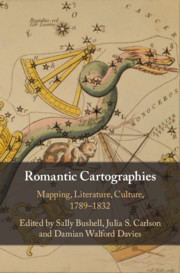Book contents
- Romantic Cartographies
- Romantic Cartographies
- Copyright page
- Contents
- Illustrations
- Notes on Contributors
- Preface
- Acknowledgements
- Introduction Romantic Cartographies
- Part I Romantic Maps, Romantic Mapping
- Part II Cartographic Encounters
- Part III Beyond Romantic Cartographies
- Chapter 9 Deep Mapping and Romanticism
- Chapter 10 Unmapping John Clare
- Chapter 11 The Problem of Precedent
- Chapter 12 Maps without Territory
- Bibliography
- Index
Chapter 11 - The Problem of Precedent
Mapping the Post-Romantic Lake District
from Part III - Beyond Romantic Cartographies
Published online by Cambridge University Press: 15 January 2021
- Romantic Cartographies
- Romantic Cartographies
- Copyright page
- Contents
- Illustrations
- Notes on Contributors
- Preface
- Acknowledgements
- Introduction Romantic Cartographies
- Part I Romantic Maps, Romantic Mapping
- Part II Cartographic Encounters
- Part III Beyond Romantic Cartographies
- Chapter 9 Deep Mapping and Romanticism
- Chapter 10 Unmapping John Clare
- Chapter 11 The Problem of Precedent
- Chapter 12 Maps without Territory
- Bibliography
- Index
Summary
In a 2009 manifesto for map studies, Martin Dodge et al. argue that there is a need for the work of scholars to be informed by the practices and processes of creative cartographers. Noting the proliferation of maps and mappings in contemporary art practice, the geographers contend that ‘creative possibilities … ought to inform our studies too, and that we ought not to separate the analytical from the creative’. This chapter picks up on this braiding of the artistic and the analytical by examining how creative cartographies can open up critical thinking about mapping, place, and Romantic writing. More specifically, this chapter expands the literary historical focus of the collection by interrogating how three post-war landscape writers – Alfred Wainwright, Sean Borodale, and Richard Skelton – have each embedded maps and mapping practices within their creative responses to a cardinal Romantic site: the English Lake District. This chapter, then, thinks critically about the work of three writer-cartographers; but, in turn, it argues that reading this creative work can facilitate critical thinking about place-specific Romantic writing.
Keywords
- Type
- Chapter
- Information
- Romantic CartographiesMapping, Literature, Culture, 1789–1832, pp. 252 - 270Publisher: Cambridge University PressPrint publication year: 2020



